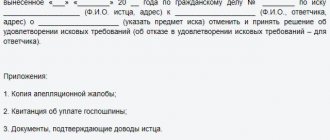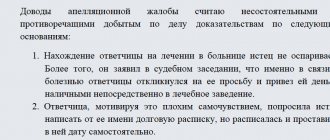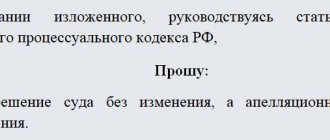Grounds for filing a cassation appeal in a criminal case
The provisions of Article 401.1. Criminal procedural “Subject of trial in cassation”, the legislator determined that the cassation court verifies, based on a cassation appeal, presentation, the legality of a sentence, ruling or court decision that has entered into legal force.
As follows from the explanations of the Supreme Court of the Russian Federation set out in paragraph 10 of the Resolution of the Plenum of January 28, 2014 No. 2 (as amended on March 3, 2015) “On the application of the norms of Chapter 47.1 of the Criminal Procedure Code of the Russian Federation governing proceedings in the court of cassation,” by virtue of Article 401.1 of the Code of Criminal Procedure of the Russian Federation, when considering a cassation appeal or presentation, the court (judge) of the cassation instance checks only the legality of court decisions, that is, the correct application of criminal norms and norms of criminal procedural law
(issues of law).
Taking into account this limitation, the arguments of a cassation appeal or presentation, if they challenge the correctness of the court’s determination of the factual circumstances of the case (questions of fact), are not subject to verification. At the same time, if the cassation appeal or presentation contains an indication of violations of the criminal procedural law committed by the court when examining or evaluating evidence (for example, justifying the verdict with inadmissible evidence), which influenced the correctness of the court’s determination of the factual circumstances of the case and led to a miscarriage of justice, such arguments should not be left unchecked.
Complaints, submissions about the injustice of a sentence for which a punishment was imposed that does not correspond to the gravity of the crime, the identity of the convicted person, or for which the court imposed an unfair punishment due to its excessive leniency or excessive severity (Part 2 of Article 389.18 of the Code of Criminal Procedure of the Russian Federation) are subject to verification by the court of cassation in if such a court decision was the result of incorrect application of the norms of the General Part of the Criminal Code of the Russian Federation (for example, the provisions of Article 60 of the Criminal Code of the Russian Federation).
If a cassation appeal or presentation, along with others, contains arguments that, by virtue of the law, are not related to the subject of verification by the cassation court, then in this part the court (judge) leaves them without verification, as indicated in the resolution (ruling).
Thus, we can conclude that the highest authority indirectly emphasizes the need for a correct presentation of the cassation appeal with a clear and motivated indication of significant violations of the rules of procedural law by lower authorities when examining or assessing evidence that influenced the outcome of the consideration of the case; unfairness of the sentence; misinterpretation or violation of the application of criminal law; inconsistency of the court decision with the circumstances of the case.
All of the above violations of the court, which, in the opinion of the applicant of the cassation appeal, violate his rights and legitimate interests by the adopted judicial act of the lower instance, will be grounds for filing a corresponding (cassation) appeal with the court.
Time limits for cassation appeal in criminal proceedings
In criminal proceedings, the period for appealing through cassation is not limited. However, based on the results of the cassation review, the situation of the convicted person can be either improved or worsened. In this case, the exception is the review in the cassation and supervisory instances of a sentence, ruling, or court decision precisely on grounds that entail a worsening of the situation of a convicted person, acquitted person, or a person against whom the criminal case has been terminated, is allowed within a period not exceeding 1 year
from the day they entered into legal force, if during the trial there were violations of the law that influenced the outcome of the case, distorting the very essence of justice and the meaning of the court decision as an act of justice (here it is important to pay attention to the explanations of the Plenum of the Supreme Court of the Russian Federation in paragraph 9 of the resolution dated January 28, 2014 No. 2 “On the application of the norms of Chapter 47.1 of the Code of Criminal Procedure of the Russian Federation governing proceedings in the cassation court”).
Cassation appeal suggesting a “turn for the worse”
A review of a judicial act by way of cassation, which implies a change in the worse direction of the position of an acquitted person, a convicted person or a person against whom a criminal case has been terminated, is permissible only within 1 year from the date of entry into force of such a judicial act (Article 401.6 of the Code of Criminal Procedure of the Russian Federation).
Note! A request to restore such a period if it is missed is not subject to satisfaction, regardless of the goodness of the reasons (clause 9 of the resolution).
The grounds for review when requiring a “turn for the worse” may include:
- significant violations of the Criminal Code of the Russian Federation, the Code of Criminal Procedure of the Russian Federation, which influenced the verdict,
- failure by the defendant to comply with the terms of the pre-trial cooperation agreement (novelty of the Code of Criminal Procedure of the Russian Federation, introduced by Law No. 322-FZ of July 3, 2016).
The right to file a cassation appeal in court
In this chapter I would like to draw attention to which persons have the right to file a cassation appeal.
The provisions of Article 401.2 of the Criminal Procedure Code of the Russian Federation (hereinafter referred to as the Code of Criminal Procedure of the Russian Federation) establish that a court decision that has entered into legal force can be appealed in the manner established by this chapter to the court of cassation by the convicted, acquitted, their defenders and legal representatives, the victim, private the prosecutor, their legal representatives and representatives, as well as
other persons to the extent that the appealed court decision affects their rights and legitimate interests.
A civil plaintiff, a civil defendant or their legal representatives and representatives have the right to appeal a court decision in the part relating to the civil claim. The following have the right to apply for a review of a court decision that has entered into legal force:
1) The Prosecutor General of the Russian Federation and his deputies - to any court of cassation;
2) a prosecutor of a constituent entity of the Russian Federation, a military prosecutor equivalent to him and their deputies
- respectively, to the presidium of the supreme court of a republic, a regional or regional court, a court of a federal city, a court of an autonomous region, a court of an autonomous district, a district (naval) military court.
That is, in short, the applicants of the cassation appeal can be: the convicted person; justified; their legal representatives and defenders; advocate; representative of the injured party; private prosecutors; other persons to the extent that the appealed court decision affects their rights and legitimate interests.
However, it is important to know that, for example, a civil plaintiff in a criminal proceeding has the right to appeal a court decision only insofar as it relates to the civil claim. As for the general decision of the court in a criminal case, he has no right to appeal it.
What is a cassation appeal?
A cassation appeal is a document that is submitted to higher authorities in order to challenge a court decision that has entered into force. A cassation can also be written in the case that the review process had violations both in terms of infringement of the rights and obligations of any of the participants in the case, and in the process itself.
Cassation is submitted to:
- An already pronounced court verdict, which concerns not only both parties, but also other participants in the meeting;
- The consideration of the criminal case occurred with violations in the process itself, as well as in its participants;
- Lack of necessary evidence;
- There is no representative of the parties;
- An error that could influence the decision.
Cassation can be filed by:
- Initially, the authors of the claim and their representatives;
- Their representatives also responded to the filed lawsuit;
- Who defend the interests of the state;
- All parties to the criminal process.
The circle of persons who have the right to petition usually includes all participants in this process; sometimes the court limits this list or adds new persons to it.
Form and content of the cassation appeal
A cassation appeal, as a procedural document, requires written presentation and, therefore, must be drawn up in a certain form.
In criminal proceedings, the rules for the content of a cassation appeal (presentation) are established by the provisions of Art. 401.4. Code of Criminal Procedure of the Russian Federation.
In accordance with paragraph 1 of the first named article in the cassation appeal,
the submission must indicate the following information:
1) the name of the court to which they are filed;
2) information about the person who filed the complaint, presentation, indicating his place of residence or location, procedural status;
3) an indication of the courts that considered the criminal case in the first, appellate or cassation instances, and the content of the decisions they made;
4) an indication of the court decisions that are being appealed;
5) an indication of significant violations of the norms of criminal or criminal procedural law committed by the courts that influenced the outcome of the case, with the presentation of arguments indicating such violations;
6) request of the person filing the complaint, presentation.
- The cassation appeal of a person who did not take part in the case must indicate what rights or legitimate interests of this person were violated by the court decision that entered into legal force.
- If a cassation appeal or presentation was previously filed with a cassation court, it must indicate the decision taken on such complaint or presentation.
- The cassation appeal must be signed by the person who filed it. The complaint filed by the defense attorney is accompanied by a warrant or other document certifying his authority. The submission must be signed by the prosecutor specified in part two of Article 401.2 of this Code.
- Copies of court decisions adopted in this criminal case, certified by the relevant court, are attached to the cassation appeal or presentation. If necessary, copies of other documents are attached that confirm, in the applicant’s opinion, the arguments set out in the cassation appeal or presentation.
The cassation appeal may also indicate telephone numbers, faxes, e-mail addresses and others necessary for proper notification of the parties about the consideration of the case, as well as existing petitions.
Failure to comply with the above requirements is grounds for returning the cassation appeal (submission) in accordance with paragraph 1 of Part 1 of Art. 401.5 Code of Criminal Procedure of the Russian Federation.
However, after eliminating the obstacles that served as the basis for returning the cassation appeal or presentation without consideration, the interested person has the right to again appeal to the cassation court (clause 6 of the resolution of the Plenum of the Supreme Court of the Russian Federation dated January 28, 2014 No. 2 “On the application of the norms of Chapter 47.1 Criminal procedural code of the Russian Federation governing proceedings in the court of cassation").
In what situations can you file a complaint?
Cassation appeals in criminal cases in accordance with Art. 401.1 of the Code of Criminal Procedure of the Russian Federation can be filed against those judicial acts (sentences, rulings and decisions) that have already entered into legal force. All persons whose interests are affected by a decision in a criminal case have the right to file such a complaint, but only to the extent that it applies to a specific person. That is, citizens from the category of convicted, acquitted, and victims can appeal the decision as a whole, and the prosecutor can also do this (by filing a cassation presentation). In the part that affects the interests of other persons specified in the court decision, a civil plaintiff or defendant may act.
It is also important to note that a cassation appeal in a criminal case can be satisfied only in the case where the decision made by the courts of the first and second instances is illegal, that is, when it was adopted by the court, the norms of substantive or procedural legislation were violated. The limits of the rights of the court of this instance are indicated in Art. 401.16 of the Code of Criminal Procedure, and now the court is not bound by the arguments of the complaint and can check the case in full. Even if the complaint came from one of several convicted persons in one criminal case, the court has the right to check the case in full, including in relation to other convicted persons.
Procedure for filing a cassation appeal
Thus, according to Part 1 of Article 401.3 of the Code of Criminal Procedure of the Russian Federation “Procedure for filing cassation appeals, presentations”
- a cassation appeal or presentation is submitted
directly to the cassation court
, which is authorized, in accordance with part two of this article, to review the appealed court decision.
Cassation appeals and presentations are submitted to:
1) verdict and ruling of a magistrate, sentence, ruling and ruling of a district court, appeal rulings and rulings, as well as interim judicial decisions of the supreme court of the republic, regional or regional court, court of a federal city, court of an autonomous region, court of an autonomous district, issued by them in the course of criminal proceedings as a court of first instance, - respectively, to the presidium of the supreme court of the republic, a regional or regional court, a federal city court, an autonomous region court, an autonomous district court
(as amended by Federal Law No. 217-FZ dated July 23, 2013);
2) court decisions specified in paragraph 1 of this part, if they were appealed in cassation to the presidium of the supreme court of the republic, regional or regional court, court of a federal city, court of an autonomous region, court of an autonomous district; a verdict or other final judicial decision of the supreme court of a republic, a regional or regional court, a court of a federal city, a court of an autonomous region, a court of an autonomous district, if these court decisions were not the subject of consideration by the Supreme Court of the Russian Federation on appeal; decisions of the presidium of the supreme court of a republic, a regional or regional court, a court of a federal city, a court of an autonomous region, a court of an autonomous district - to the Judicial Collegium for Criminal Cases of the Supreme Court of the Russian Federation
(as amended by Federal Law No. 382-FZ dated December 28, 2013);
3) the verdict, ruling and ruling of the garrison military court, appeal decisions and rulings of the district (naval) military court - to the presidium of the district (naval) military court (as amended by Federal Law No. 217-FZ of July 23, 2013);
4) interim judicial decisions of the district (naval) military court, rendered by it during criminal proceedings as a court of first instance - to the presidium of the district (naval) military court
;
5) court decisions specified in paragraph 3 of this part, if they were appealed in cassation to the presidium of the district (naval) military court; a verdict or other final judicial decision of a district (naval) military court, if they were not the subject of consideration by the Supreme Court of the Russian Federation on appeal; resolutions of the presidium of the district (naval) military court - to the Judicial Collegium for Military Personnel of the Supreme Court of the Russian Federation
(Clause 5 as amended by Federal Law No. 29-FZ dated March 12, 2014).
At the same time, the Supreme Court of the Russian Federation in paragraph 3 of the Plenum Resolution No. 2 dated January 28, 2014 (as amended on March 3, 2015) “On the application of the norms of Chapter 47.1 of the Criminal Procedure Code of the Russian Federation governing proceedings in the cassation court” indicated that
, that the proceedings in the court of cassation are carried out in compliance with the requirement of instance established by Article 401.3 of the Code of Criminal Procedure of the Russian Federation, in accordance with which a cassation complaint, presentation, as well as a criminal case, are first considered in a lower and then in a higher court of cassation. At the same time, courts should keep in mind that a court decision can be appealed to the Judicial Collegium for Criminal Cases of the Supreme Court of the Russian Federation, to the Military Collegium of the Supreme Court of the Russian Federation, provided that it was appealed to the Presidium of a lower court (paragraphs 2 and 5 of Part 2 Article 401.3 of the Code of Criminal Procedure of the Russian Federation as amended by Federal Law of December 28, 2013 N 382-FZ).
The decision of a judge of a district court, a garrison military court, issued in execution of a sentence, regardless of the court at what level the sentence was pronounced, can be reviewed in cassation only in compliance with the authority established by part 2 of Article 401.3 of the Code of Criminal Procedure of the Russian Federation, that is, by the presidium of the relevant the supreme court of the republic, a regional, regional or equivalent court, and then the Judicial Collegium for Criminal Cases of the Supreme Court of the Russian Federation, the Military Collegium of the Supreme Court of the Russian Federation.
A cassation appeal or presentation, in which the verdict and the judge's decision made in execution of the sentence are simultaneously appealed, are subject to consideration by the court of cassation, which is competent to review the verdict, regardless of which district court judge (of the same or another subject of the Russian Federation) made the decision in order of execution of the sentence.
Where is cassation in a criminal case sent?
The cassation appeal is transferred to such bodies as:
- To the Presidium of the Supreme Court;
- To the Judicial Collegium of the Supreme Court of the Russian Federation;
- To the Presidium of the District Court;
- To the Military Collegium.
All transmission methods are divided into:
- Personal submission if possible of course. Important! It is necessary to make an appointment in advance, otherwise you may not be accepted, since there are many citizens ;
- Post office. Russian Post, everyone knows that this organization is engaged in the transfer of letters from one city to another, and also works with parcels. To file a complaint against a salon with a higher authority, you must type or handwrite the complaint and attach evidence and a list of the documents contained in the letter.
It is better if the letter is sent with a registered notification, then the sender will know the date the letter was received by the addressee.
You can submit a complaint in any convenient way, in any case, the response after receipt must come within 30 days.
Legal regulation of cassation proceedings in criminal cases
To correctly and competently draw up a cassation appeal in a criminal proceeding, it is necessary to be guided by the provisions of the current criminal procedural legislation given below.
Chapter 47.1
Criminal Procedure Code of the Russian Federation dated December 18, 2001 No. 174-FZ (as amended on December 19, 2016) (as amended and supplemented, entered into force on January 1, 2017).
Resolutions of the Plenums of the Supreme Court of the Russian Federation:
dated February 10, 2009 No. 1 (as amended on November 29, 2016) “On the practice of courts considering complaints in accordance with Article 125 of the Criminal Procedure Code of the Russian Federation”;
dated 04/21/2009 No. 8 (as amended on 11/17/2015) “On the judicial practice of parole from serving a sentence, replacing the unserved part of the sentence with a more lenient type of punishment”;
dated January 28, 2014 No. 2 (as amended on March 3, 2015) “On the application of the norms of Chapter 47.1 of the Criminal Procedure Code of the Russian Federation governing proceedings in the cassation court.”
Reviews of the practice of the Supreme Court of the Russian Federation also clarify many provisions regarding the legal regulation of the cassation appeal process.
No. 3 (2015) (approved by the Presidium of the Supreme Court of the Russian Federation on November 25, 2015),
No. 4 (2015) (approved by the Presidium of the Supreme Court of the Russian Federation on December 23, 2015),
No. 3 (2016) (approved by the Presidium of the Supreme Court of the Russian Federation on October 19, 2016).
Government duty
The norms of Tax legislation, in particular the provisions of Chapter 25.3 “State Duty” of the Tax Code of the Russian Federation, do not provide for the payment of state duty in criminal cases, including for filing a cassation appeal.
A cassation appeal is one of the most complex procedural actions, the essence of which is the preparation of a motivated and justified document - a cassation appeal. After all, if the applicant does not correctly and objectively indicate significant violations of the law and the judicial process itself, committed in the appealed judicial acts, it will be simply impossible to change their resolution in the cassation court.
It is important to deeply study the case materials before starting to write your position, correctly determine the grounds for appealing judicial acts and find reasoned reasons for justifying errors and incorrect conclusions of the courts, comparing or refuting them with the appropriate norms of a particular law.










